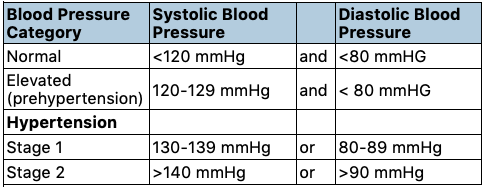
You Have Hypertension That Could Lead to Heart Failure: Here’s What You Can Do
FEBRUARY 08, 2023
By THE CORMEUM TEAM
Hypertension, or high blood pressure, is a common but serious condition that happens when the force of the blood against your artery walls is consistently too high. The CDC estimates that nearly half of all adults in the U.S. have hypertension — defined as a systolic blood pressure greater than 130 mmHg or a diastolic blood pressure greater than 80 mmHg — yet only about one in four have their condition under control.
Left untreated, hypertension can lead to other heart problems, including heart failure. In fact, according to the American Heart Association (AHA), “The thickening and/or stiffening of the heart’s walls, as well as narrowing and constriction of blood vessels caused by high blood pressure, are the most common non-cardiac causes of heart failure.”
In this article, we will explore the risks of hypertension and discuss what you can do to manage the condition. We’ll also talk about lifestyle changes you can make to help reduce your risk of developing cardiovascular diseases — like heart failure — as a result of your hypertension.
What Is Hypertension?
A normal blood pressure reading is around 120/80 or lower. The first number is called systolic pressure. It measures the pressure in your blood vessels when your heart beats. The second number is called diastolic pressure. It measures the pressure in your blood vessels when your heart is at rest between beats. Think of it like a pump pushing blood through your body and the pressure being the force of the pump.
You’re considered hypertensive if your systolic pressure consistently reaches 130 or above. The CDC offers the following guidelines for your blood pressure reading:

If your blood pressure reaches 180/110 or higher more than once per week, seek medical treatment right away. This is what’s known as a hypertensive crisis.
You may have heard hypertension referred to as “the silent killer.” That’s because those with high blood pressure may go years, even decades, without realizing they have developed the conditions. Symptoms, which can include headaches, dizziness, nosebleeds, chest tightness and shortness of breath, can be subtle and easily attributed to other things.
“High blood pressure usually has no warning signs or symptoms, and many people do not know they have it,” the CDC notes. “Measuring your blood pressure is the only way to know whether you have high blood pressure.”
What Causes Hypertension?
There is no one cause of hypertension. The condition typically develops over time and can be attributed to any or all of a number of factors, including obesity, smoking, excessive alcohol consumption, stress and genetic predisposition.
If you have been diagnosed with hypertension, your doctor will likely recommend lifestyle changes, medication or a combination of the two to help lower your blood pressure. Making healthy choices — such as eating a balanced diet, maintaining a healthy weight, exercising regularly and avoiding tobacco use — can help keep your blood pressure under control.
Can Hypertension Lead to Heart Failure?
In a word, yes. Over time, your high blood pressure continually strains your heart, making it harder to pump blood. This causes the heart muscle to thicken and weaken, which can then lead to heart failure.
“High blood pressure makes men twice as likely and women three times more likely to get heart failure,” according to the Cleveland Clinic. “However, having your high blood pressure well managed can greatly reduce your risk of heart failure.”
The good news is there are things you can do to lessen your risk of developing heart disease — even if you currently have hypertension.
Managing Hypertension
The first step in managing hypertension is to know your numbers. If you haven’t checked your blood pressure in a while (or ever), now is the time. Your provider will recommend some or all of the following to help get your blood pressure under control.
Regular checkups. Checking in regularly with your provider can help you monitor your blood pressure and track your progress. If your blood pressure is consistently high, your provider may adjust your medications or recommend additional changes.
Self-monitoring. While not a substitute for doctor’s visits, the AHA recommends all patients with hypertension monitor their blood pressure at home. It’s easy to do and can help you and your provider determine whether your treatment and mitigation efforts are working as they should.
Choose a cuff-style monitor that has been validated for clinical accuracy. You may also consider keeping a blood pressure journal or simply recording the day, time and number of your readings on your phone.
Medication. In some cases, medication may be necessary to manage hypertension. Your doctor may prescribe diuretics, alpha-blockers, beta-blockers or ACE inhibitors to help lower your blood pressure.
Lifestyle changes. The best way to keep your blood pressure under control is through lifestyle changes. The AHA recommends the following heart-healthy lifestyle changes to keep your blood pressure in check:
- Eat a well-balanced diet that’s low in salt
- Limit alcohol
- Enjoy regular physical activity
- Manage stress
- Maintain a healthy weight
- Quit smoking
- Take your medications properly
Daily tracking. Studies like this one published in Digital Health have shown that patients with chronic medical conditions who have access to a mobile health app are “more likely to use them to track their health goals, make decisions about their health and talk to their doctors about their health.”
That’s because apps like Cormeum are a convenient (right on your phone) way to keep you accountable as you implement healthy lifestyle changes. Cormeum also makes it easy to share your progress with your care team so providers have all the info they need to support you in staying well.
Change for Good
There’s no cure for hypertension — but unlike heart disease, which is not reversible, making healthy lifestyle changes and taking medication as prescribed can lower your blood pressure. A study published in the medical journal Lancet found that a 10 mm Hg reduction of systolic blood pressure reduced the risk of heart failure by 28%.
It’s important to talk to your doctor about developing a personalized plan to manage hypertension, including regular check-ups to monitor your blood pressure. Small changes such as incorporating more fruits and vegetables into your diet, reducing sodium intake and adding regular exercise can positively affect your overall health and well-being.
Managing hypertension is a lifelong commitment, but with the right tools and support, you can reduce your risk of heart disease and improve your quality of life.

